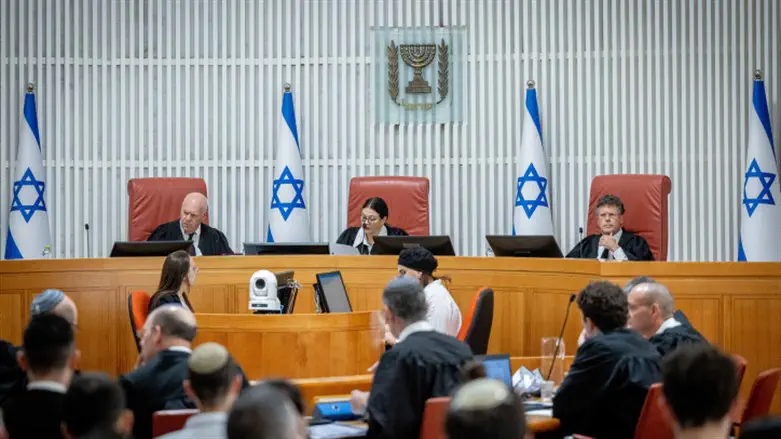
The Supreme Court, in an expanded composition of all 15 of its judges, will on Monday morning at 9:00 a.m. hear the petitions against the reasonableness standard. The hearing will be broadcast live on Israel National News.
The government will be represented at the hearing by lawyer Ilan Bombach, due to the differences between its positions and the position of the Attorney General, who claims that the Supreme Court should intervene in the Basic Law and cancel the amendment to it.
The Supreme Court has never invalidated or interfered with Basic Laws and over the years the judges who have served on it on various occasions have said that such invalidation is reserved for particularly extreme cases.
The first to argue at the hearing will be the representative of the Knesset and a private lawyer on behalf of MK Simcha Rothman. Then the lawyer Bombach will argue his arguments, then the representatives of the Attorney General. After that, the representatives of the petitioners against the law will present their arguments.
The decision regarding the petitions will not be made today and it is expected to be given in a few weeks and before the retirement of the president of the Supreme Court, Justice Esther Hayut, who can publish judgments until the beginning of 2024.
The Minister of Justice, Yariv Levin, said prior to the hearing that, "The hearing that is taking place today in the Supreme Court, with a complete lack of authority, is a fatal injury to democracy and the status of the Knesset. The presidents and Supreme Court justices for generations also all agreed - the people are the sovereign, and their will is expressed in the Basic Laws enacted by the Knesset. The discussions on the possibility of invalidating Basic Laws, which are the top of the legal pyramid in Israel, and on the possibility of deciding the Prime Minister is unfit to serve, are a fatal injury to the people's rule."
According to him, "The court, whose judges elect themselves in private chambers and without protocol, places itself above the government, above the Knesset, above the people and above the law. This situation is completely contrary to democracy. It means a court without checks and balances at all. A single ruler. No more rule of the people. The argument by which the court justifies the discussion of invalidating Basic Laws is that it must prevent Basic Laws that shake the foundations of Israel as a Jewish and democratic state. But what really shakes the foundations of democracy in Israel is the discussion that the court is holding today."
"Until today, despite extremely problematic judicial activism, there was at least one agreed-upon foundation - the court respected the Basic Laws. This is the foundation that preserved democracy in Israel. The responsibility to maintain this common foundation lies at the door of the court," the minister concluded.
The head of the opposition, MK Yair Lapid, wrote in response: "I have been a Knesset member for 11 years. I was Prime Minister and Minister, I'm even the son of a former Minister of Justice. I know what a Basic Law looks like, I know how it is enacted. The 'amendment to Basic Law: The Judiciary' that comes up for discussion in the Supreme Court today is not a Basic Law. It is an irresponsible document that someone wrote 'Basic Law' on, and since then they demand that it be treated like the Holy Scriptures."
"This morning the Supreme Court will discuss the law which is a crooked and bully private proposal of Simcha Rothman, which was not passed by the government at all, which was conducted in a violent, hasty, careless, flashy, unrestrained procedure, which has nothing to do with the enactment of Basic Laws. This legislation is not worth having a national quarrel. Those who want Basic Laws to be treated with reverence, let them start by enacting them properly. The Supreme Court should not go into the essence of the law. It should only say to the government: 'Do you want us not to discuss Basic Laws? So enact them properly.' Basic Law have a procedure. There is some minimum of respect that is due to the process. This minimum was not met. Not even close," Lapid claimed.
He stated that "If it was a real Basic Law, I would be in trouble. I had a much harder time with the question, 'Do you think the Supreme Court can discuss Basic Laws?' I had to answer a long, complex answer, concerning the foundations of the Israeli system, the built-in tension between the authorities, the question of what exactly is a 'democratic Jewish state.' This law spares me the problem. It is not related to the debate. It's not really a Basic Law."
In the meantime, the activists of the Im Tirtzu movement arrived early in the morning with a quarter ton of bananas and banana trees and set up a protest display at the entrance to the Supreme Court, with the aim of illustrating to the public that the debate on the Basic Laws turns Israel into a "banana republic that destroys democracy."
Matan Peleg, the chairman of the movement, said: "The judges think they are saving democracy, but in reality they are destroying it and turning Israel into a banana republic, a third-world country. This is what the public will remember from Esther Hayut. The Chief Justice who destroyed our safe place and turned it into a territorial jungle infected with political interests and alienated from the will of the people. This is not a democracy, this is a dictatorship."
